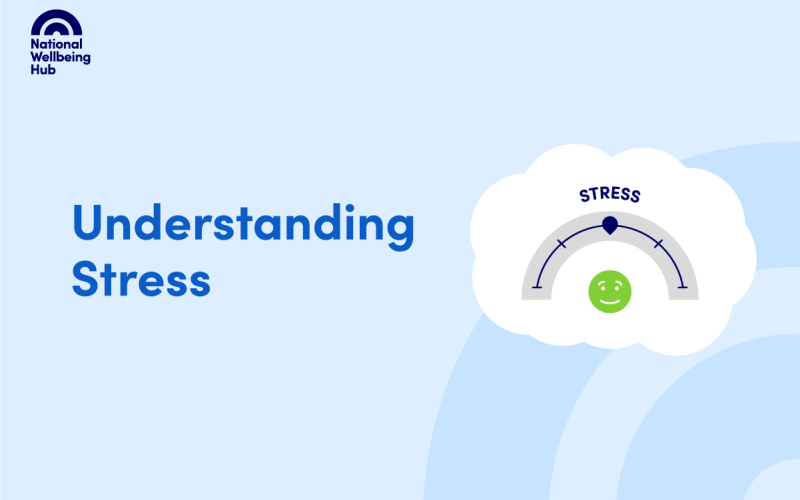Managing your stress

Stress is the distress we experience when the demands placed on us outweigh the resources we have to deal with them. It’s a balancing act, and maintaining the right balance can help you with both your wellbeing and your work. A little bit of stress can be a good thing, it can help with concentration, motivation and performance. Too much stress, however, is problematic and can leave you exhausted, anxious, and in some cases can lead to burnout.
A lot of the time, we know that we’re stressed; we recognise the feelings and the situations which have brought them up. Other times it can sneak up on us and we may not immediately identify stress as the cause of what we’re experiencing. It’s important to get to know your early warning signs for stress, to give you the best opportunity to manage it before things get too bad. This resource from Mind can help you build your understanding of some of the common physical, psychological and behavioural changes which can be the result of stress.
To help you identify what causes or worsens stress for you, it can be helpful to keep a stress diary. For a template of a stress diary to help you get started, you can try this one from MindWell Leeds. GPs will sometimes recommend this process when diagnosing stress problems. Over a couple of weeks, or longer if needed, make a note of when you feel stressed. You can include details like where you were, what you were doing, how you felt, and what you were thinking. This technique can help you identify your stress triggers, meaning you can be more specific in the strategies you use to cope. NHS Inform have more information on recognising your stress triggers, which you can find here.
Coping with stress
Often managing stress comes down to knowing the right type of strategy to use in the right situations. Sometimes you know a stressful situation is coming and there are things you can do in advance to lessen its impact. Other times stressful situations are unavoidable, and you can only change how you feel to make them more tolerable. For example, if you know multiple team members are off sick, you can speak to your manager to arrange cover or to prioritise specific tasks over others to lessen how overwhelmed you feel. Whereas if someone you’re caring for goes into cardiac arrest you may need to focus on your training or past experience to allow you to better cope in the moment or speak with colleagues after the event to allow you to express how you are feeling.
For more ideas on how to manage stress, have a look at the Royal College of Nursing’s Stress and You guide, which you can download by following this link.
Plan ahead and manage your time
When you know demands are coming, planning ahead can be the simplest way to reduce the impact they have on you. Make a list of the tasks that you need to do and tackle the most difficult ones first, so you’re not leaving them until the end of the day when you’re already tired. If money problems or debt are causing you stress, seek advice for what options are available to you, Citizen’s Advice can often be the best first point of call in these situations.
Managing your time effectively can help you avoid getting bogged down in any one thing. It’s natural to want to finish everything you start, and to feel like you’ve failed or underachieved if you don’t get things finished at the first attempt. Often it’s better to allocate a set amount of time and move onto something else if you’re getting nowhere. The time away can help you refocus and approach the original task from a different angle. For help to manage your time more effectively, have a look at these easy time-management tips from NHS Inform.
Talk about how you’re feeling
Speaking up, to your colleagues or managers, can help to normalise what you’re going through as well as bringing it to other people’s attention that you might need a bit of support. Speaking to colleagues can get you some emotional support to help you through. This type of peer support can be one of the best ways of minimising the impact of stressful work situations. We’ve put together a page full of resources around peer support, which you can find here. Speaking to your manager allows you to work together to set realistic targets. It can also alert them to the fact that you’re struggling before things escalate too far.
If you’re under pressure or stress outside of work, speak to your friends or family about what you’re going through. If you don’t feel able to, or you’d find it easier to speak to someone more neutral, there are a number of options available to you. The National Wellbeing Helpline provides a compassionate listening service which you can access 24/7 by calling 0800 111 4191. More information about the helpline is available here. Alternatively, there may be local listening or support services available in your area. We’ve compiled some of these on our regional services pages, just follow this link and then select your region from the map to find what’s available. If you’re feeling stress around your finances, follow this link for services you can get in touch with who may be able to help.
Give yourself a break
It can be tempting to work more when you’re already feeling stressed; it can sometimes feel like the only way to lessen your burdens. It’s really important to give yourself a break though. Taking some time away from your challenges can help you to regulate how you’re feeling, as well as giving the opportunity to refocus on what’s needed or how to approach the task. That goes for your annual leave too. We all get the fear about returning from holidays, fear of what our inbox will look like, fear of losing a day wading through emails, fear of what has slipped while we were away, and fear of being bombarded with requests now we’re back. But taking your annual leave is vital, if nothing else to remind you that there’s more to life than work.
More resources to help you manage stress
Beat Stress at Work – Practical guidance from NHS Inform.
Steps to deal with stress – a simple guide to stressing less and enjoying life more.
Tips for managing stress and burnout – our top tips to help you cope.
Stress and the workplace – an e-Module for anyone who wants to understand how pressure and stress can impact on wellbeing
Silvercloud Space from Stress – an online Cognitive Behavioural Therapy module. Follow the link to register with Silvercloud.

Welcome to the Hub. We hope you’ll find the support you’re looking for. To help us improve the site and make it relevant to you, please take a minute to answer a few quick questions. Thank you.
Give us feedback








